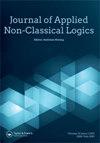An empirical and axiomatic comparison of ranking-based semantics for abstract argumentation
Q1 Arts and Humanities
引用次数: 0
Abstract
Argumentation is the process of evaluating and comparing a set of arguments. A way to compare them consists in using a ranking-based semantics which rank-order arguments from the most to the least acceptable ones. Recently, a number of such semantics have been proposed independently, often associated with some desirable properties. In this work, we provide a thorough analysis of ranking-based semantics in two different ways. The first is an empirical comparison on randomly generated argumentation frameworks which reveals insights into similarities and differences between ranking-based semantics. The second is an axiomatic comparison of all these semantics with respect to the proposed properties aiming to better understand the behaviour of each semantics.抽象论证中基于排序语义的经验与公理比较
论证是评价和比较一组论证的过程。比较它们的一种方法是使用基于排序的语义,该语义将参数从最可接受的到最不可接受的进行排序。最近,许多这样的语义被独立地提出,通常与一些理想的属性相关联。在这项工作中,我们以两种不同的方式对基于排名的语义进行了全面的分析。首先是对随机生成的论证框架进行实证比较,揭示了基于排名的语义之间的异同。第二步是根据所提出的属性对所有这些语义进行公理化比较,旨在更好地理解每个语义的行为。
本文章由计算机程序翻译,如有差异,请以英文原文为准。
求助全文
约1分钟内获得全文
求助全文
来源期刊

Journal of Applied Non-Classical Logics
Arts and Humanities-Philosophy
CiteScore
1.30
自引率
0.00%
发文量
8
 求助内容:
求助内容: 应助结果提醒方式:
应助结果提醒方式:


